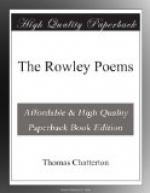HAROLDE.
True, so wee sal doe best
to lyncke the chayne,
And alle attenes[134] the
spreddynge kyngedomme bynde.
No crouched[135] champyone
wythe an harte moe feygne 100
Dyd yssue owte the hallie[136]
swerde to fynde,
Than I nowe strev to ryd mie
londe of peyne.
Goddwyn, what thanckes owre
laboures wylle enhepe!
I’lle ryse mie friendes
unto the bloddie pleyne;
I’lle wake the honnoure
thatte ys now aslepe. 115
When wylle the chiefes mete
atte thie feastive halle,
That I wythe voice alowde maie there upon
’em calle?
GODDWYN.
Next eve, mie sonne.
HAROLDE.
Nowe, Englonde, ys the tyme,
Whan thee or thie felle foemens
cause moste die.
Thie geason[137] wronges bee
reyne[138] ynto theyre pryme; 120
Nowe wylle thie sonnes unto
thie succoure flie.
Alyche a storm egederinge[139]
yn the skie,
Tys fulle ande brasteth[140]
on the chaper[141] grounde;
Sycke shalle mie fhuirye on
the Normans flie,
And alle theyre mittee[142]
menne be sleene[143] arounde. 125
Nowe, nowe, wylle Harolde
or oppressionne falle,
Ne moe the Englyshmenne yn vayne for hele[144]
shal calle.
KYNGE EDWARDE AND HYS QUEENE.
QUEENE.
Botte, loverde[145], whie
so manie Normannes here?
Mee thynckethe wee bee notte
yn Englyshe londe.
These browded[146] straungers
alwaie doe appere, 130
Theie parte yor trone[147],
and sete at your ryghte honde.
KYNGE.
Go to, goe to, you doe ne
understonde:
Theie yeave mee lyffe and
dyd mie bowkie[148] kepe;
Theie dyd mee feeste, and
did embowre[149] me gronde;
To trete hem ylle wulde lette
mie kyndnesse slepe. 135
QUEENE.
Mancas[150] you have yn store,
and to them parte;
Youre leege-folcke[151] make moke[152]
dole[153], you have theyr worthe asterte[154].
KYNGE.
I heste[155] no rede of you.
I ken mie friendes.
Hallie[156] dheie are, fulle
ready mee to hele[157].
Theyre volundes[158] are ystorven[159]
to self endes; 140
No denwere[160] yn mie breste
I of them fele:
I muste to prayers; goe yn,
and you do wele;
I muste ne lose the dutie
of the daie;
Go inne, go ynne, ande viewe
the azure rele[161],
Fulle welle I wote you have
noe mynde toe praie. 145
QUEENE.
I leeve youe to doe hommage
heaven-were[162];
To serve yor leege-folcke
toe is doeynge hommage there.
KYNGE AND SYR HUGHE.
KYNGE.
Mie friende, Syr Hughe, whatte tydynges brynges thee here?
HUGHE.
There is no mancas yn mie
loverdes ente[163];
The hus dyspense[164] unpaied
doe appere; 150
The laste receivure[165] ys
eftesoones[166] dispente[167].




